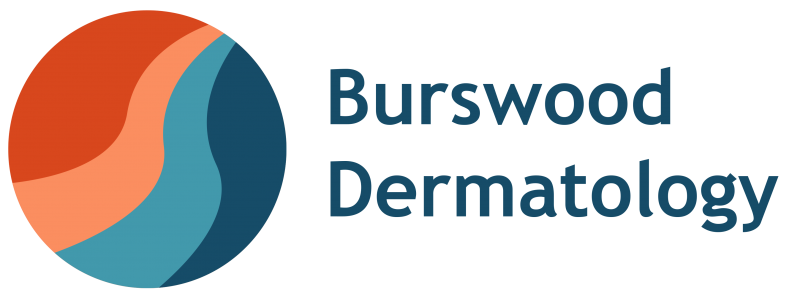-
General Dermatology
Burswood Dermatology cares for the skin of patients from infancy to the very elderly. More conditions affect the skin than any other branch of medicine. Infections, inflammatory conditions, skin cancers and various cosmetic problems are all part of this dermatology practice
-
Skin Checks
Most skin cancers can be successfully treated if detected early. However, without any treatment, skin cancers can be deadly.
It is important for you to know your own skin, and what looks normal for you to help you find changes earlier. Try to get into the habit of checking your skin regularly.
When you see our dermatologists for a complete skin checkup, expect a 10-15 minute visit including a review of your medical history and a head-to-toe skin examination. During your examination, it is important to show the doctor any spots that you are concerned about.
-
Skin Cancer
Skin cancer is a disease in which malignant (cancerous) cells form in the tissues of the skin.
Most skin cancers develop on the visible outer layer of the skin (the epidermis), particularly in sun- exposed areas (face, head, hands, arms and legs). They are usually easy to detect by examining the skin. Early detection allows for less invasive treatments, including non surgical therapies and improved outcome.
There are three common types of skin cancers:
Basal Cell Carcinomas (BCCs)
Squamous Cell Carcinomas (SCCs)
MelanomaDermatologists are the experts in the detection and treatment of skin cancers.
-
Skin Surgery
At Burswood Dermatology, we offer on site surgical operations including excisions, curettage and biopsies. Our dermatologists are experienced and fully trained in dermatological surgery having completed many thousands of skin surgeries.
We also do more complex surgery including flaps and grafts. We have two fully equipped stand alone theatres in our practice.
One of our dermatologists specialises in Mohs surgery procedures. This is performed at Southbank Day Surgery in South Perth.
All of our pathological specimens are referred to accredited Histopathology laboratories. The cost of this service is mostly covered by Medicare.
Some skin cancers are amenable to treatment with non surgical techniques, and we have a photodynamic therapy service available to patients on site.
-
Psoriasis
Psoriasis is a chronic skin disorder that causes red, scaly patches on the limbs, trunk, scalp and other parts of the body.
There are many forms of psoriasis that dermatologists see and this includes:
Chronic plaque psoriasis
Guttate psoriasis
Pustular psoriasis
Inverse psoriasis
Erythrodermic psoriasis
Palmo-plantar psoriasis
Childhood psoriasisThere are a variety of treatment options available depending on the type of psoriasis, and the patient’s medical condition. It is important to know that a treatment which works for one person with psoriasis may not work for another. Some treatments of psoriasis include:
Topical steroid and topical calcipotriol
Phototherapy
Oral systemic therapies
Biologic therapy -
Eczema / Dermatitis
Eczema is a group of diseases that cause inflammation of the skin. It usually begins in infancy or early childhood, but can also present in young adults, or later in life.
Symptoms can range in severity from mild itching and redness to severe blistering, thickened and cracked skin.
Some of the most common forms of eczema include:
Atopic dermatitis: this is the most common from of eczema and is an allergic disease believed to have a hereditary component. It often runs in families whose members have asthma or hay fever. It is very common in infants and toddlers who may ‘grow out of it’ by school age. The itchy red rash is particularly noticeable on head and scalp, neck, elbow creases, and behind the knees.
Contact dermatitis: this is a localised skin reaction to an allergen or irritant. It causes redness, inflammation and itching in areas directly in contact with the allergen or irritant.
Seborrhoeic dermatitis: this is a common skin condition that mainly affects the scalp. It causes red scaly patches or stubborn dandruff. It can also affect areas of the body which have a tendency to produce oil including the face, sides of the nose, ears, eyelids, eyebrows and chest.
Burswood Dermatology offers patch testing to find out whether the eczema may have been caused or aggravated by a contact allergen.
Eczema treatment:
The management of eczema should include both general measures and targeted treatment:
Applying moisturisers on a regular basis
Use of soap free washes
Avoiding contact with the irritant or allergenTopical steroids
Topical calcineurin inhibitors (non steroid topical therapy)
Phototherapy
Oral systemic therapies
Biologic therapy -
Acne
Acne is a very common skin problem that shows up as an outbreak of bumps commonly known as pimples or zits. It is often a source of emotional distress and in severe cases, can lead to permanent acne scars.
Acne is most common in teenagers due to surging hormone levels (androgens) during puberty which create more active sebaceous glands.
Acne treatment can fall into the following categories:
Topical cream treatments
Oral antibiotics
Oral isotretinoin
Hormonal therapies (female patients) -
Vitiligo
Vitiligo is a skin condition that turns patches of skin and hair white. These patches commonly appear on the hands, feet, arms, face and lips, although any part of the skin can be affected.
Treatment for vitiligo include:
Creams (such as topical corticosteroids) that are applied onto the skin.
Phototherapy: a treatment where ultraviolet light is exposed to the skin. This service is offered in Burswood Dermatology and is bulk billed.
